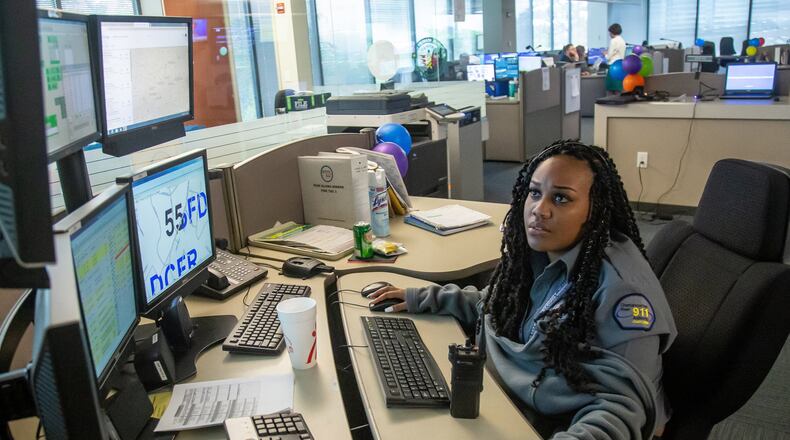Nearly a month in, Sandy Springs says its first-in-Georgia false alarm ordinance has been working — meaning police officers are working less on responding to likely false alarms.
The Sandy Springs City Council on Tuesday got its first sense from the police department of how the alarm ordinance is doing since the law started June 19: Capt. Dan Nable said false alarms were down 77% from the previous 30 days, when almost every call was false.
“The alarm ordinance is having a desired effect,” Nable said.
After eight years of tweaking the ordinance and traveling to research cities with similar laws, the city says it is now the first in Georgia whose police will not respond to home and business burglary alarms without video, audio or in-person verification that a crime is occurring. The law also includes steep fines on alarm companies for repeated false alarms.
BACKGROUND | Police won't respond? Sandy Springs law shows tension with alarm groups
The law currently only affects the 14,080 registered alarms in the city of 100,000 residents, but it could set a legal precedent for other cities to follow, state policing experts say. The law is being challenged in court by a group of alarm companies.
Of the 8,000 alarm calls last year in Sandy Springs, 99% were false alarms, police previously said. That accounted for 17% of all calls to the 911 dispatch center. City leaders said they approved the law in part because false alarms distract police and dispatchers from actual emergencies.
At first, residents didn't like hearing that officers won't show up to possible emergencies at their homes or businesses. But the truth is that the cops weren't rushing to these alarms anyway. Sandy Springs Police Chief Ken DeSimone said his department's average burglar alarm response time is 40 minutes, which is basically useless because a criminal is almost always gone by then.
Credit: Courtesy of Sandy Springs Police
Credit: Courtesy of Sandy Springs Police
With a verified alarm, police are much more likely to zip right over to a crime in progress, like they did June 29.
Nable told City Council on Tuesday that video footage from an alarm company showed three people who appeared to be burglarizing a construction site. At the time, the department was looking for a missing child, but some officers were dispatched to the burglary because they had video evidence of a crime.
“It resulted in three arrests of burglars, exactly as we want the ordinance to (do),” Nable said.
BACKGROUND | Fewer false alarms the goal of Sandy Springs' home alarm ordinance
He said there are no reports of police not showing up to an actual crime.
Eric Widner, general manager of Kennesaw-based Loud Security Systems, said he hopes the law doesn’t catch on because he feels it’s not only a burden on alarm companies but it makes some of his 400 Sandy Springs customers feel unsafe.
“The process is just simply that we’re declining dispatches over and over even when the customer requests it,” Widner said. “Whether there’s an emergency or not, the perception from the customer is that police are not dispatching and they don’t feel safe in their homes.”
Like North Fulton County News Now on Facebook | Follow on Twitter
The story so far
Sandy Springs started fining homeowners for false alarms in 2012.
After a brief dropoff, the volume of false alarms returned to normal.
With 9,500 false alarms a year on average, the police chief deemed the calls a waste.
That led the city to requiring verification before police respond to an alarm.
In March 2018, alarm companies and industry groups together sued the city, claiming the Sandy Springs false alarm fine policy was unconstitutional and misplaced.
The lawsuit was tossed by a federal judge in December.
The group of alarm companies and industry coalitions appealed the ruling in early 2019.
The case is pending in the federal 11th District Court of Appeals.
The new alarm ordinance requiring verification took effect June 19.
How it works
When a home or business burglary alarm is triggered, the alarm company is required by Georgia law to call the homeowner and, if needed, a back-up number provided by the homeowner of someone (usually a neighbor) who could confirm if there’s an actual emergency or a mistake has been made like someone putting in the wrong pass code.
Before the law, if no one could confirm there’s a problem, the alarm company would call the Sandy Springs non-emergency line, which was answered by a call center in Orlando. That non-emergency operator’s job was to get information like the home/business address or where in the building the alarm had been activated before calling a 911 operator in Sandy Springs with that information. That local 911 operator could then dispatch police.
Since the ordinance took effect on June 19, verified intrusion calls have been going directly to local police dispatchers instead of the Orlando call center.
If the call isn’t verified, the companies are on the hook for fines. Before 2017, customers were at risk of being fined for a false alarm.
The combination of verified response and fining alarm companies is found nowhere else in Georgia and could set a precedent in the state, according to experts.
About the Author
The Latest
Featured


